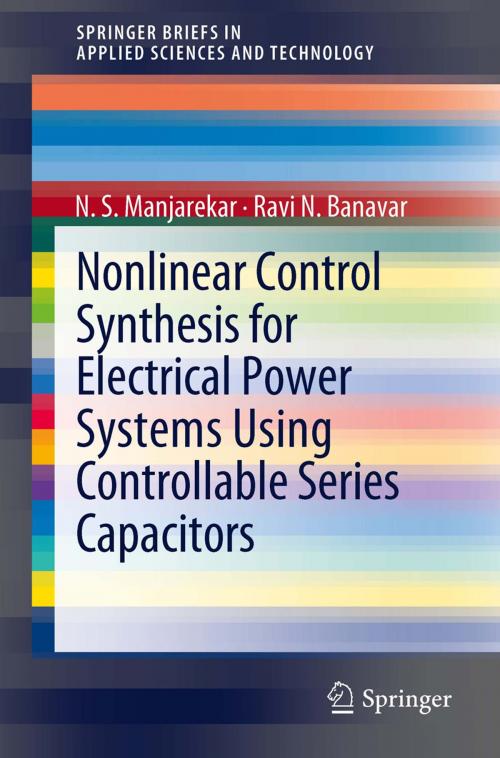Nonlinear Control Synthesis for Electrical Power Systems Using Controllable Series Capacitors
Nonfiction, Science & Nature, Technology, Machinery, Power Resources| Author: | N S Manjarekar, Ravi N. Banavar | ISBN: | 9783642275319 |
| Publisher: | Springer Berlin Heidelberg | Publication: | February 10, 2012 |
| Imprint: | Springer | Language: | English |
| Author: | N S Manjarekar, Ravi N. Banavar |
| ISBN: | 9783642275319 |
| Publisher: | Springer Berlin Heidelberg |
| Publication: | February 10, 2012 |
| Imprint: | Springer |
| Language: | English |
In this work we derive asymptotically stabilizing control laws for
electrical power systems using two nonlinear control synthesis techniques.
For this transient stabilization problem the actuator considered is
a power electronic device, a controllable series capacitor (CSC).
The power system is described using two different nonlinear models - the second order swing equation and the third order flux-decay model.
To start with, the CSC is modeled by the injection model which is
based on the assumption that the CSC dynamics is very fast as compared to the dynamics of the power system and hence can be approximated by an algebraic equation. Here, by neglecting the CSC dynamics, the input vector $g(x)$ in the open loop system takes a
complex form - the injection model. Using this model, interconnection and damping assignment passivity-based control (IDA-PBC)
methodology is demonstrated on two power systems: a single machine infinite bus (SMIB) system and a two machine system.
Further, IDA-PBC is used to derive stabilizing controllers for power systems, where the CSC dynamics are included as a first order system.
Next, we consider a different control methodology, immersion and invariance (I\&I), to synthesize an asymptotically stabilizing control law for the SMIB system with a CSC. The CSC is described by a first order system. As a generalization of I\&I, we incorporate the power balance algebraic constraints in the load bus to the
SMIB swing equation, and extend the design philosophy to a
class of differential algebraic systems. The proposed result is then demonstrated on another example: a two-machine
system with two load buses and a CSC. The controller performances are validated through simulations for all cases.
In this work we derive asymptotically stabilizing control laws for
electrical power systems using two nonlinear control synthesis techniques.
For this transient stabilization problem the actuator considered is
a power electronic device, a controllable series capacitor (CSC).
The power system is described using two different nonlinear models - the second order swing equation and the third order flux-decay model.
To start with, the CSC is modeled by the injection model which is
based on the assumption that the CSC dynamics is very fast as compared to the dynamics of the power system and hence can be approximated by an algebraic equation. Here, by neglecting the CSC dynamics, the input vector $g(x)$ in the open loop system takes a
complex form - the injection model. Using this model, interconnection and damping assignment passivity-based control (IDA-PBC)
methodology is demonstrated on two power systems: a single machine infinite bus (SMIB) system and a two machine system.
Further, IDA-PBC is used to derive stabilizing controllers for power systems, where the CSC dynamics are included as a first order system.
Next, we consider a different control methodology, immersion and invariance (I\&I), to synthesize an asymptotically stabilizing control law for the SMIB system with a CSC. The CSC is described by a first order system. As a generalization of I\&I, we incorporate the power balance algebraic constraints in the load bus to the
SMIB swing equation, and extend the design philosophy to a
class of differential algebraic systems. The proposed result is then demonstrated on another example: a two-machine
system with two load buses and a CSC. The controller performances are validated through simulations for all cases.















